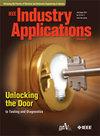Physics Informed Data-Driven Oscillation Stabilization Strategy for Renewable-Dominant Power Systems Based on Koopman Operator
IF 4.2
2区 工程技术
Q2 ENGINEERING, ELECTRICAL & ELECTRONIC
引用次数: 0
Abstract
With the high penetration of volatile renewable energy generations (REGs), oscillations have emerged frequently worldwide. Unlike the low-frequency oscillations in conventional power systems, oscillations in renewable-dominant power systems exhibit higher frequencies, involve more nonlinearities, and seriously threaten the stable operation. The main technical challenges of oscillation stabilization design are the nonlinearity, the complexity and the difficulty in obtaining models of renewable-dominant power systems. To cope with the paradigm shift, this paper proposes a physics informed data-driven oscillation stabilization (PDOS) strategy based on Koopman operator (KO), which offers the merits of strong interpretability and high computational efficiency. Firstly, the global linearization of the nonlinear dynamics is captured based on KO. Subsequently, a physics informed data-driven KO predictor is proposed, with the construction of basis functions adapted to power systems and introduction of physical constraints. This predictor can more accurately characterize the nonlinear oscillation behavior. Finally, using the KO-based linear quadratic regulator informed by physics, PDOS can online stabilize oscillations by regulating the control references of REG inverters. Case studies illustrate that the proposed strategy can stabilize oscillations effectively, adaptively and robustly, and the introduction of physics can enhance the control performance.基于Koopman算子的可再生电力系统振荡稳定策略
随着易失性可再生能源发电(REGs)的高度普及,振荡现象在世界范围内频繁出现。与传统电力系统的低频振荡不同,可再生能源主导电力系统的振荡频率更高,涉及更多的非线性,严重威胁着系统的稳定运行。可再生电力系统振荡稳定设计的主要技术挑战是系统模型的非线性、复杂性和难以获得。为了应对这种范式转变,本文提出了一种基于Koopman算子的物理信息数据驱动振荡稳定(PDOS)策略,该策略具有可解释性强和计算效率高的优点。首先,基于KO捕获非线性动力学的全局线性化;随后,提出了一种基于物理的数据驱动KO预测器,构建了适合电力系统的基函数,并引入了物理约束。该预测器能更准确地表征非线性振荡行为。最后,利用基于ko的线性二次型调节器,PDOS可以通过调节REG逆变器的控制基准来在线稳定振荡。实例研究表明,该策略能有效地自适应、鲁棒地稳定系统的振荡,并能有效地提高系统的控制性能。
本文章由计算机程序翻译,如有差异,请以英文原文为准。
求助全文
约1分钟内获得全文
求助全文
来源期刊

IEEE Transactions on Industry Applications
工程技术-工程:电子与电气
CiteScore
9.90
自引率
9.10%
发文量
747
审稿时长
3.3 months
期刊介绍:
The scope of the IEEE Transactions on Industry Applications includes all scope items of the IEEE Industry Applications Society, that is, the advancement of the theory and practice of electrical and electronic engineering in the development, design, manufacture, and application of electrical systems, apparatus, devices, and controls to the processes and equipment of industry and commerce; the promotion of safe, reliable, and economic installations; industry leadership in energy conservation and environmental, health, and safety issues; the creation of voluntary engineering standards and recommended practices; and the professional development of its membership.
 求助内容:
求助内容: 应助结果提醒方式:
应助结果提醒方式:


